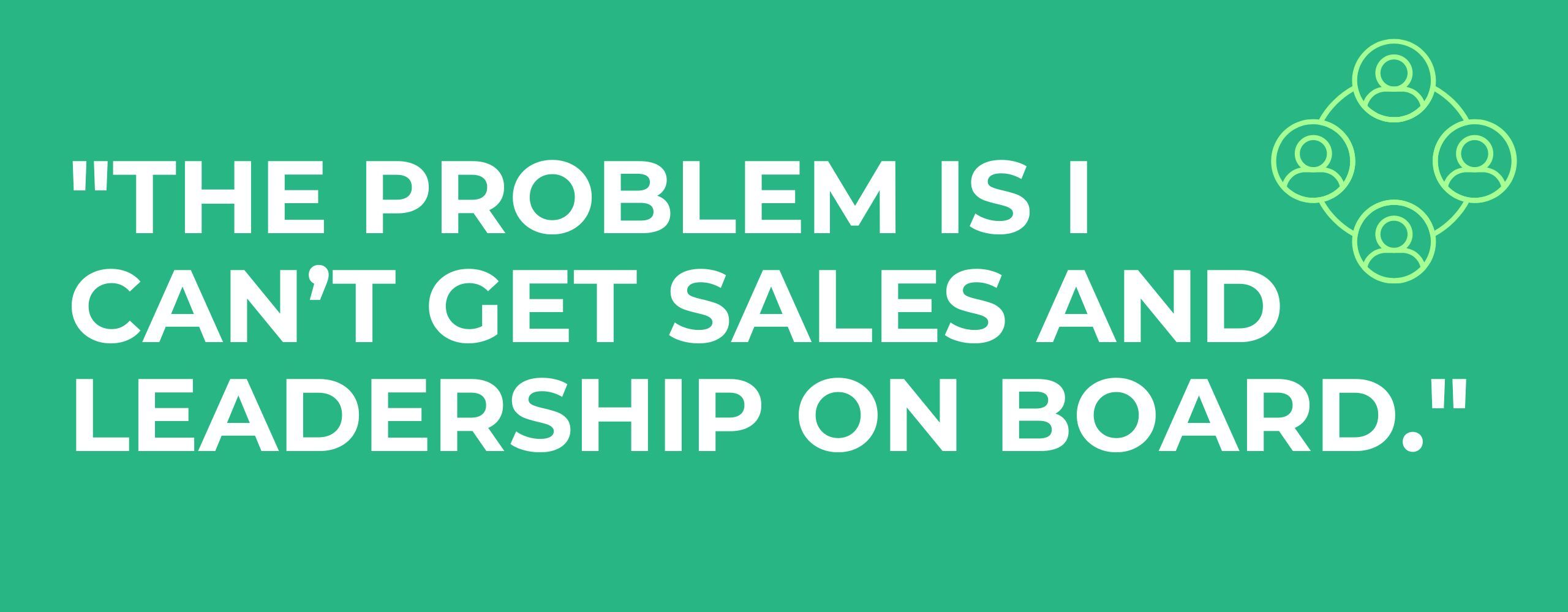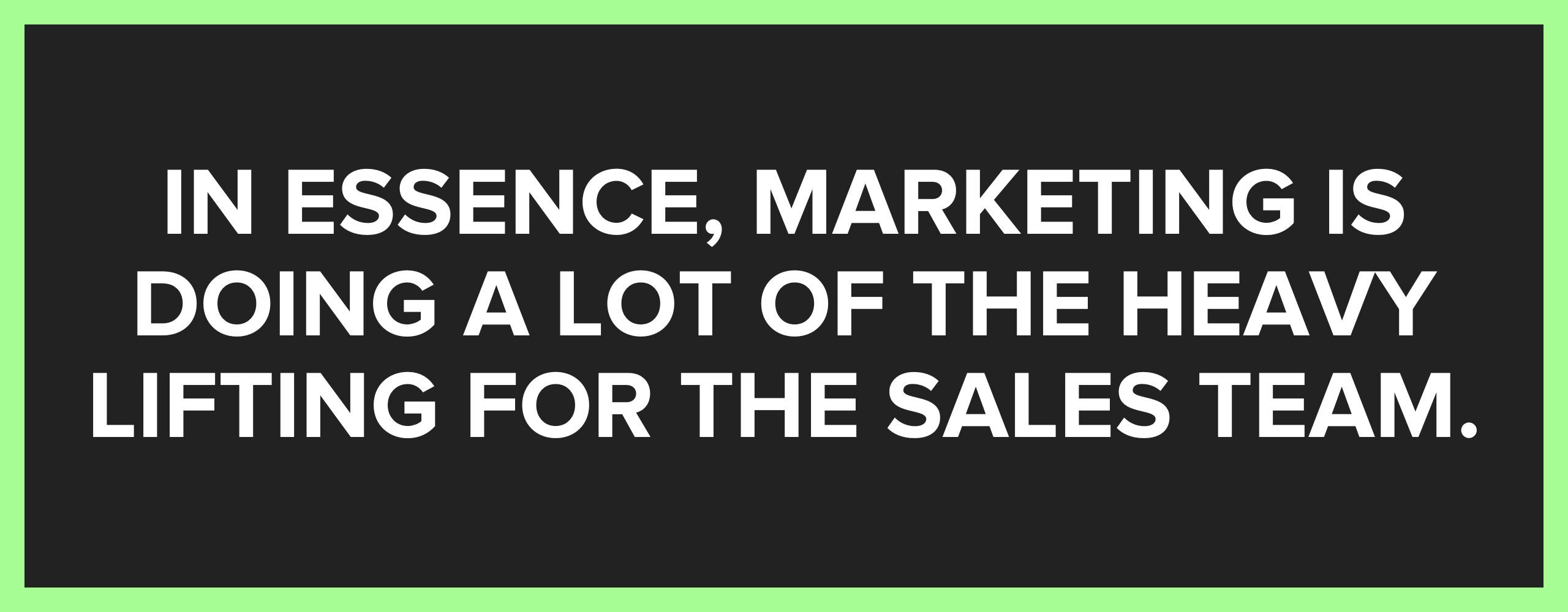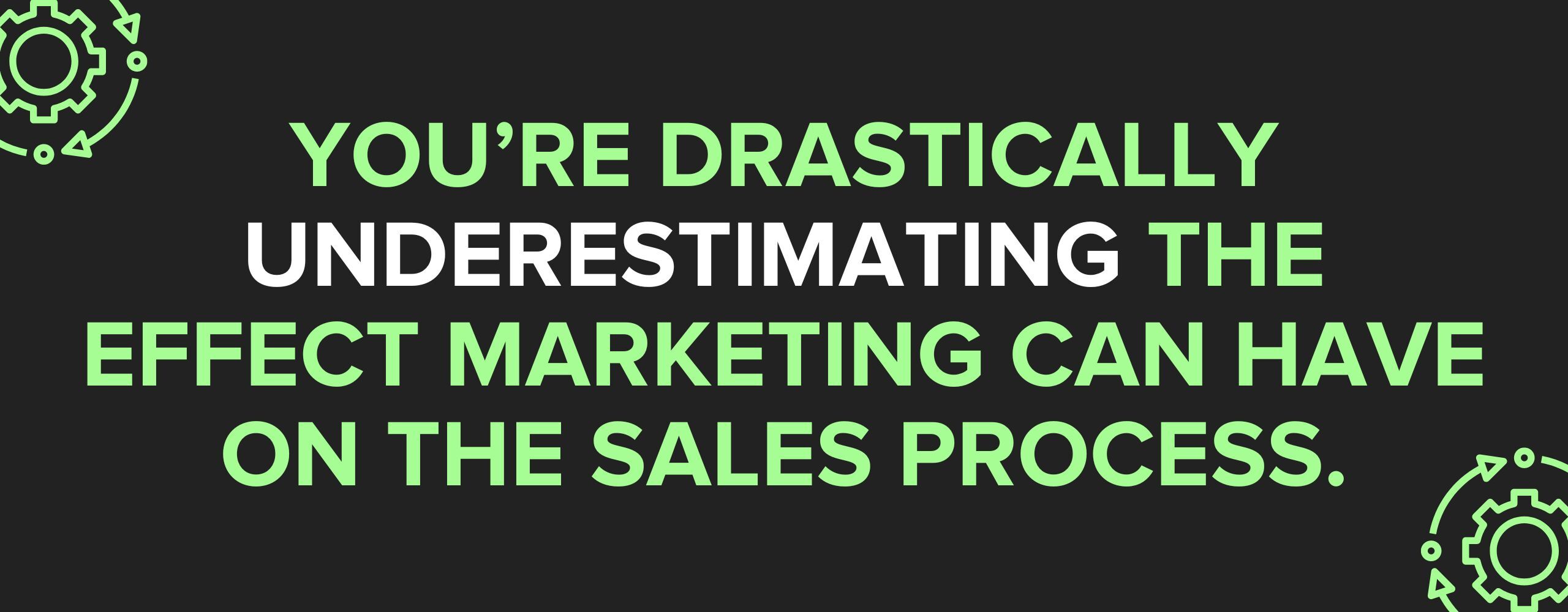Subscribe now and get the latest podcast releases delivered straight to your inbox.
How a Lack of Sales and Leadership Buy-in Is Killing Marketing Morale Worldwide

Mar 6, 2023

Having spent the past 13 years speaking to business groups all over the world and writing about marketing, I get contacted daily by people looking for advice.
You’d think that the most frequent call I get is from businesses looking to build their audience and increase sales.
But, no. That’s number two.
Number one, by a landslide, is some version of:
“Hey, Marcus. I believe in what you're saying, but the problem is I can’t get sales and leadership on board, and because of that, I’m going to have to leave the company if nothing changes.”
It’s a sort of Hail Mary outreach. I can feel the frustration coming through the text of what I read, and I know how hard these people are working, how committed they are — and I sympathize with them.

Studies show that the average tenure of a CMO today is shorter than it’s ever been due to burnout and aggravation.
But it doesn’t need to be this way.
Ask yourself: who's doing the heavy lifting?
The best digital marketers out there have recognized the overlap that exists today between sales and marketing.
They recognize that the buying process has changed and that customers educate themselves about purchasing decisions long before they talk to a sales rep.
The problem is, many sales reps don’t recognize this.
The way they see it, they're having calls with leads, just as they have for decades. However, what they’re not seeing is the significant educational journey that lead has taken before having that call.
They might not realize that, over the course of weeks or months, the lead has consumed website content and become a social media follower. They've become a more educated and informed consumer.

In doing so, by the time a lead is talking to a sales rep and entered the sales process, they’re much more qualified than they might have been before.
In essence, marketing is doing a lot of the heavy lifting for the sales team.
Website content is educating potential customers about products and services and about company values and culture.
However, because sales has no concept of this, they still see marketing as that other department — not as a peer and certainly not as an equal.
For leadership, it’s very much the same issue. The majority of C-level executives still see sales as revenue and marketing as an expense.
Therein lies our core issue.
Until companies start to see marketing as a driver of revenue, they will continue to be left behind — and marketers will continue to feel underfunded, under-resourced, and under-appreciated.
Marketing plays an ever-bigger role in sales
Many sales reps still think, “Okay, I got a lead and I closed the lead, so I handled the majority of the sale.”
However, much of the effort necessary to get the lead in their hands was put in by marketing.

Truth be told that lead might not have existed if a certain piece of marketing content hadn’t brought them to your website in the first place. And, perhaps that lead read through 12 other pieces of your content, followed you on YouTube, and registered for your webinar.
Every interaction with marketing brought back information and insight — all while establishing your company’s expertise.
In turn, that lead was much farther down the funnel when sales stepped in, which could help shorten the sales cycle and improve close rates.
To state it plainly, many sales teams’ impression of their own influence on a closed deal is much too high, while their impression of marketing’s influence on a closed deal is much too low.
...But most SMBs are reluctant to see it this way
Marketing's under-recognized impact on sales is most egregious in small and medium businesses (SMBs).
If you’re a business that’s below $2 million in annual revenue, it’s likely you don’t even have a marketing department. Many of these companies want to grow by hiring more salespeople, while their only marketing efforts are what they outsource to agencies: most likely, the firm that built their website.
In the unlikely case a small business has a marketing department, it’s likely one person who wears other hats, too.

As a result, we see astoundingly understaffed marketing departments, leading to staff burnout and missed opportunities.
Often, the ratio of sales to marketing might be ten to one. If that’s the case in your business, you’re drastically underestimating the effect marketing can have on the sales process.
In my experience, one videographer can make as much of an impact on revenue as five salespeople. The problem is, many companies find this difficult to track.
Marketing and sales need to work together
More and more often, when I’m seeing companies fully catch the They Ask, You Answer vision, I’m seeing them get rid of “Sales” and “Marketing.”
Instead, they’re opting for a blended group they call the Revenue Team. With this sort of structure:
- Marketers can take greater responsibility of revenue — something they’ve long avoided.
- Sales, for their part, will be forced to update their perspective on buyer behavior and acknowledge the new terrain in the buyer’s journey.
For the company, this is a win-win. You break down the silos that have separated departments so that the content that’s produced is helpful in the sales cycle.
Alignment between marketing and leadership
A couple years ago when I spoke at HubSpot's INBOUND conference, I asked a very large audience, “How many of your companies have sales teams?” Almost everyone in the audience put up their hand.
Then I said, “How many of you have members of your sales team here at this event?” A few hundred hands went down. Only two or three people in the room had salespeople with them.
At these major events and conferences that are talking about the future of marketing, approximately 90% of attendees are marketers. Roughly 5% are from leadership. Maybe 2% are from sales.
These conferences aren’t just about the future of marketing, they’re about the future of business, but only one component of most companies is in attendance, and that’s a major problem.
When you think about it, marketers who are there are the ones who need it the least. They already know that the customer experience has changed. Leadership and sales are the ones who really need these lessons.

True progress can only be made when leadership gets in the same room as marketing and receives the same messages and engages in the same discussion about the what, the how, and the why of evolving commerce.
That way, we can truly eliminate resistance and establish alignment.
A smart leadership team will say to sales, “Okay, as part of your job description, you have to spend 30 minutes a month talking with somebody in marketing as a subject matter expert.”
This way, it happens regularly without fail.
Marketing has content, salespeople establish their expertise, and leadership facilitates the connection between the departments.
A culture of alignment
Alignment has become a company buzzword of sorts. It’s the kind of thing that everyone talks about, but few actually do well.
Alignment comes from two things. Fundamentally, it comes from culture. Then, secondly, it comes from devoting the necessary time.
Accountability is crucial with these.
Put it in writing. Schedule the meetings. Do the back-end work to make it easy for the teams to come together.
Furthermore, it’s important that businesses work to tell the story of the value created by marketing content, both in data and in anecdote.
Tracking views, shares, clicks, and other engagement metrics is an important first step. Next, track content engagement in the actual sales process. If an ebook, video, or article helped someone close, that's marketing having an impact on revenue.
When we acknowledge and celebrate the role marketing plays — when we see marketing as an engine driving business, not an expense — we naturally move towards a healthy alignment between sales and marketing.
And marketers feel valued.
However, businesses need leadership to set the course, allotting the necessary time and resources. When leadership, sales, and marketing are all aligned, companies can move forward together, and that growth can be phenomenal. It’s just important to have everyone on the bus.


Order Your Copy of Marcus Sheridan's New Book — Endless Customers!